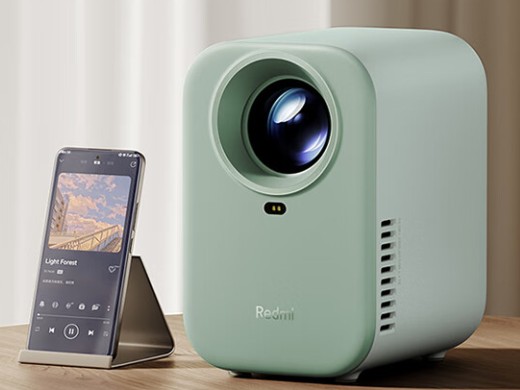Redmi Projector Lite Green Edition with artificial intelligence for image adjustments
13.08.24
Xiaomi has unveiled a new version of its projector — the Redmi Projector Lite Green Edition. The new product features a stylish green body, but retains the main characteristics of previous models.
The projector supports 1080p resolution and provides a brightness of 150 CVIA lumens, which allows you to project an image up to 100 inches in size. The device is equipped with a ToF sensor for automatic focus and image correction, which ensures clarity and ease of use.
The projector has also received SGS certification for low blue light emission, making it safer for your eyes. A sealed optical engine protects the device from dust and other contaminants, extending its service life.
In addition, the projection is automatically adjusted using artificial intelligence, which allows you to easily adjust the image angle. HDMI, USB 2.0, audio output and a power connector are provided for connection to the device. An extended three-year warranty is included with the projector, which is a nice bonus for buyers.
It is already available in the Chinese market at a price of $110. This model is an upgrade of the Redmi Projector Lite series released in March 2024, which cost $97.
Don't miss interesting news
Subscribe to our channels and read announcements of high-tech news, tes
Oppo A6 Pro smartphone review: ambitious

Creating new mid-range smartphones is no easy task. Manufacturers have to balance performance, camera capabilities, displays, and the overall cost impact of each component. How the new Oppo A6 Pro balances these factors is discussed in our review.
Acer Nitro Lite 16 (NL16-71G) laptop review: versatile and attractive

The 2025 Acer Nitro Lite 16 features an interesting case design, gaming accents, and proven components. Let’s take a closer look at its features.
Lenovo Yoga 9i 2-in-1 Aura Edition 11th Gen Unveiled at MWC 2026 laptop Lenovo MWC
Lenovo introduced the updated Lenovo Yoga 9i 2 in 1 Aura Edition Gen 11 transformer during MWC 2026 in Barcelona. The key innovation is Canvas Mode.
Xiaomi introduced 6 monitors priced from $70 to $290 monitor Xiaomi
Flagship was the Xiaomi Mini LED Gaming Monitor G Pro 27Qi 2026. The model is equipped with a 27-inch WQHD panel with Mini LED backlighting and 1152 local dimming zones


